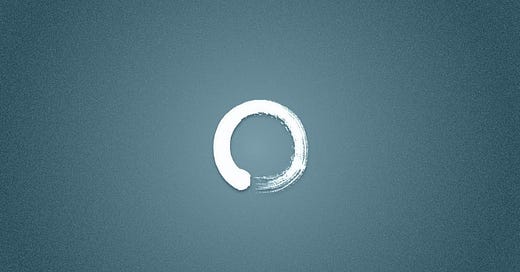A Thought on "Basho's Staff - Encore Holiday Post
From "The Center Within" Reading - Podcast Episode 3
In the essay, Basho’s Staff, from The Center Within by Rev. Gyomay Kubose, he talks about the “staffless staff” as meaning that “The truth is not static. Truth is always dynamic. Truth changes because everything changes.”
This is the nature of reality, as is highlighted in the “Three Marks of Existence.” The three marks are: Impermanence, suffering or dissatisfaction, and no-self or not-self.
Impermanence means nothing stays the same; nothing is static—not even the things you have labeled as true.
We are ignorant of these three marks. If we have studied Buddhism or done any reflection on life, we really do know these things. They show up in our lives every day. What makes us foolish is that we act as if they aren’t true—that things should stay the same, that we should always be perfectly comfortable, and that we are a discrete, non-changing self.
When living in an illusory world, we live our lives as if all our thoughts and emotions are the truth and our perspective of life IS reality. And that’s where all our troubles begin. It is why we suffer. It is why we are angry or afraid. It is why we see “others” as the cause of our problems.
The Buddha taught mindfulness so that we can catch ourselves in the act of characterizing the things that are happening to us based on our mental conditioning: This is bad and I need to push it away or react in fear, anger, or anxiety; this is good and I want to create more of the experience, ignoring or avoiding everything else that is happening; and this is neutral so I’ll let it pass through and completely forget it.
If we apply mindfulness to the experiences that happen to us, rather than unconsciously riding the train of experiences and perceptions, and the judgment and reactivity of mental conditioning, then we will develop good sense. Western philosophers understood this power of mindfulness, too. Aristotle proposed the power of perception as the way to monitor and regulate the five senses and labeled it as “common sense.”
In Basho’s Staff, Rev. Kubose explains it like this:
Zenji Basho points out the the way of Buddhism is to be free from “goof and bad,” “having and not having,” “is and is-not.” You must transcend duality because reality, life, truth are always changing. This is the path to freedom and continuously fresh, dynamic life.
All of this got me thinking about our inherent ignorance. I’ve been writing about this in my next book. I wrote this:
Delusion is our natural state. I know that sounds pessimistic and a little like the “original sin” of Christianity, where Eve questioned the words and authority of God and took a bite of the forbidden fruit, sentencing all of us to a charge of sinners.
I continued to write: “The natural state of delusion I’m talking about has no sinful or evil intent. The problem is lack of intention.”
Last night I was listening to an audio book by the wise and prolific writer, thinker, and Catholic priest, Father Richard Rohr, where he was inviting his readers to think about the story of “The Fall” or “original sin” in a different way. He said that God warned Adam and Eve not to sample the fruit from the tree of knowledge and he invited us to think of this story through a non-dual, perennial-truth lens. This warning from God was a good warning—a warning not take as our sustenance the dependence on conceptual thinking, which is always based on subject-object.
This is our inherent ignorance. It isn’t sinful or evil but it does contribute to our suffering by keeping us in ignorance. As Rev. Gyomay Kubose wrote: “You must transcend duality because reality, life, truth are always changing. This is the path to freedom and continuously fresh, dynamic life.”
This is free post, reflecting on Rev. Gyomay Kubose’s writings. I plan on posting these free reflections occasionally, with more regular reflections posted as part of the offerings to paid subscribers. Consider subscribing now as a holiday gift to yourself. Or gift yourself and another. Happy Holidays!




This really resonated with me—especially the idea that delusion is our natural state, not in a sinful sense, but simply because we lack intention. I’ve caught myself so many times reacting to life as if things should stay the same, as if I should always be comfortable, and that my perspective is the absolute truth. It’s humbling to realize how much of my suffering comes from resisting change rather than embracing it.
Thank you for this! I love the different interpretation of the Garden of Eden and the warning of dependence on conceptual thinking. I have never heard this before and it’s very interesting! It seems I am always getting caught in the net of delusion. I often find myself being too analytical, trying to “understand things” and get to the bottom of it. This reminded me to embrace the uncertainty and accept that even when you find “the thing” or “the reason,” the thing or reason changes. Truth does indeed change. 🙏❤️